Gotham Seeing Huge Influx of Retailers From Asia, and NYC Is Only the Beginning
By Lauren Elkies Schram April 11, 2018 9:00 am
reprints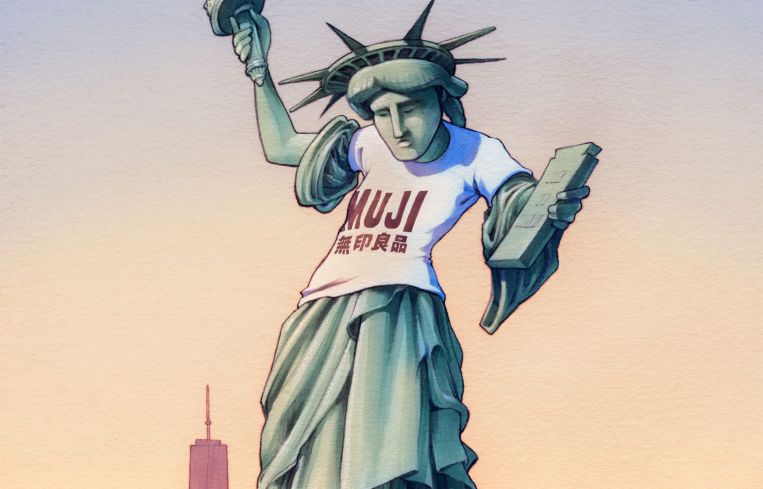
“If I had to agree to live in one country, or even one city, for the rest of my life, never leaving it, I’d pick Tokyo in a second.”
So said quintessential culinary nomad, chef extraordinaire and TV personality Anthony Bourdin to Maxim magazine last August.
And when the Japanese—and those from other parts of Asia—import their foods and restaurant concepts to the U.S., Americans can get a taste (or a reminder) of life abroad.
“It allows people to live out their Anthony Bourdain fantasy,” said Steven Hall, the founder of Hall PR, which has handled public relations for Japanese restaurant brands with U.S. outposts.
In recent years, Americans have embraced a myriad of Asian imported retail concepts on U.S. turf of the edible variety or otherwise.
One popular brand from Japan, lifestyle retailer Muji, is celebrating its 10-year anniversary in the U.S. on April 28 with the reopening of its first-ever U.S. store at 455 Broadway in Soho following a redesign and expansion.
“We knew that we wanted our first location in the U.S. to open in New York as we had an existing customer base of international travelers there who knew our brand from their trips to Japan and other cities around the world,” Muji USA President Toru Tsunoda said in a statement to Commercial Observer. “Soho was particularly of interest not only because it’s a strong retail district but because it was an ideal mix of tourists and locals for debuting our brand widely.”
In addition to the Soho store, Muji has 14 New York City U.S. outposts. The company—which launched in Japan in 1980 and has 400 stores in that country, plus 400 in London—selects its new locations by using its “e-commerce sales to inform which locations are key markets for us,” Tsunoda added. “Thus far, we’ve had the most success on the East and West Coasts but eventually plan to expand beyond these areas.”
Muji has flourished in the U.S. due to its “nice Japanese sensibility,” said Michael Hirschfeld, the vice chairman of national retail tenant services for JLL. “There’s a certain elegance to the Japanese.”
Miki Motegi-Hall, the director of Japanese business development at brokerage Vicus Partners, is working with critically acclaimed Japanese chef Yuji Tani on a lease at 620 Franklin Avenue in Crown Heights, Brooklyn. Tani has a Japanese restaurant called House in Tokyo, and hopes to bring his French-inspired Japanese cuisine to the U.S. by way of Brooklyn.
Motegi-Hall said Brooklyn is the way to go in part because the rent is cheaper than in Manhattan, and the Crown Heights spot works because it’s close to neighborhoods with more well-established retail like Prospect Heights and Clinton Hill.
Tani emailed in Japanese via Motegi-Hall that Americans will like his food because it “mixes European-style cuisine (French) and healthy Japanese-flavored ingredients, which creates a taste and visuals like never before.”
And that’s why the landlord likes this tenant for the space.
“The landlord loves it, because it’s different,” said TerraCRG’s Peter Schubert, a managing director of commercial leasing, who is representing the landlord, Crow Hill Development, in the deal. “It’s French Japanese. It’s not sushi.”
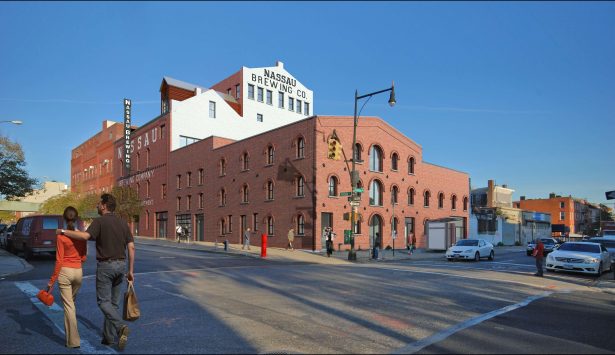
Japanese restaurant owners are particularly sweet on the U.S., Motegi-Hall said, because the population there is shrinking and “the rest of Asia is becoming oversaturated with Japanese restaurants.”
The Japanese-born father-and-son owners of specialty grocery store Sunrise Mart, which has three locations in Manhattan, are opening a 30,00-square-foot Japanese-themed market and food hall called Japan Village in Industry City, the 16-building complex on the Brooklyn waterfront, as CO reported last October.
“The owners’ concept is to create a place for the Japanese community that will become a gathering place for residents of Brooklyn,” Eastern Consolidated’s Harris Bulow, who brokered the Industry City deal for the tenant, said in a statement. “Japan Village will include a Sunrise Mart, Japanese food hall, [Japanese pub] and sake store.”
According to SCG Retail’s Chase Welles, who represented Industry City in the deal, the village will open in late spring.
“It is a great location for them because Industry City’s innovation mindset lets innovators and makers think out of the box, and the retail audience comes to IC to see what’s new, fresh and where tomorrow’s retail is going,” Welles emailed.
Also in Industry City is the state’s first sake brewery, Brooklyn Kura, which opened in January. The owners, however, are Americans who met in Japan in 2013.
A Tokyo company, Asahi Shuzo International, the producer of Dassai premium Junmai Daiginjo sake, is planning to open a sake brewery in Hyde Park, N.Y.
At the end of last year, Asahi Shuzo International paid around $8 million for a vacant site where it will bring its first brewing facility outside of Japan, according to attorney David Berlyne, a partner of DLA Piper, who represented Asahi Shuzo International in the deal. The company is planning to invest $28 million into a 52,500-square-foot facility adjacent to the Culinary Institute of America, at 5 St. Andrews Road. Plans include public tours and a retail space.
Berlyne said the location by the culinary school was key, as were the financial incentives from the state.
“There’s an opportunity for Asahi Shuzo Company [parent company of Asahi Shuzo International] to work with the Culinary Institute and really create something special for people who are studying at the Culinary Institute and people who want to visit Asahi Shuzo Company and visit and tour the area,” Berlyne said.
Construction has commenced and the facility should be open early next year, Berlyne said.
On the fast-fashion side, Uniqlo has had great success in the U.S. The Japanese company is even venturing into the Bronx for the first time, at the three-year-old Mall at Bay Plaza, Prestige Properties & Development’s project at 200 Baychester Avenue in the Baychester section. (And last month, Uniqlo announced in the fall it will open its first store in Hawaii, in Honolulu’s Ala Moana Center.)
The Bronx store will span 8,000 square feet with an additional 2,000 square feet of storage space, said Jerry Welkis of Welco Realty who along with Etan Shalem negotiated on behalf of Prestige with Uniqlo.
“We were actually courting them from the time we started leasing Bay Plaza,” Welkis said. “We really wanted them to come initially to the mall because it’s a little unique—it’s not in every single mall in the country—we love the product, we thought it was a very good value at a good price point—an it’s the image we wanted.”
But Uniqlo wasn’t biting initially. It wanted to see how sales went at the mall first, Welkis said. Once he could show that sales were strong, the company was “convinced it was a place they wanted to be,” he added.
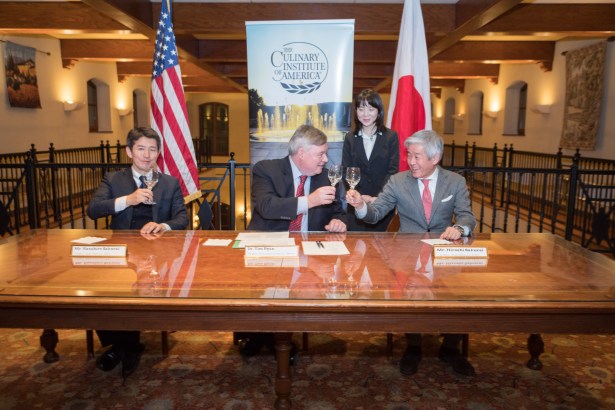
Uniqlo entered the U.S. in 2006, seeing that market as critical to its success.
“The U.S. market is the most competitive and difficult in the world,” said Uniqlo parent company Fast Retailing Co. President Genichi Tamatsuka in 2004, according to The Japan Times. “If we have capabilities to win in the United States, I think we will be able to compete anywhere else in the world.”
As for the success of Uniqlo, which has been compared to Gap and H&M, Hirschfeld said, “I happen to be a huge fan of Uniqlo. The value for the dollar is extraordinary. It is fast-fashion that is well made and not disposable.”
On the Japanese food front, last week Ichiran Ramen, known for its solo dining booths, opened at 132 West 31st Street between Avenue of the Americas and Seventh Avenue. That location marks the Japanese ramen chain’s second outpost in the U.S. The first restaurant opened in Bushwick, Brooklyn in October 2016 along with a noodle factory next door.
Iori Hanai, PR manager for Ichiran NY, emailed CO via its PR representative: “Our president [Manabu] Yoshitomi always wanted to bring tonkotsu ramen to the world, and many people asked him to open up in New York. That’s the biggest reason why we opened in the U.S., in particular New York.”
As for entering the U.S. by way of Bushwick, Hanai said, “We spent a lot of time looking for locations in Manhattan and Brooklyn, but we first needed to build a noodle factory, and we were looking for a place that is large enough for that. We eventually found a space in Bushwick that was perfect in size, so we did research on the neighborhood, and discovered this neighborhood to be a place where people accept new concepts and ideas.”
The factory produces enough noodles for five to six shops, so the company hopes to open at least two more locations within the next two years.
Japan isn’t the only Asian nation with a foothold in New York retail; some Korean companies have gotten firm footing in the U.S.
Two such Korean chains on the food side are Caffe Bene and Paris Baguette.
“They’re sort of like the Starbucks so to speak of Korea, or the Au Bon Pain of Korea,” Welkis said of both companies.
Welkis negotiated a deal on behalf of a Hackensack, N.J. landlord with Paris Baguette for 2,500 square feet near 99 Ranch Market, an Asian supermarket chain, which is opening soon. (The market, the largest Asian supermarket chain in the U.S., was established in California in 1984.)
The location makes sense; Hackensack is part of Bergen County, which Welkis said has one of the biggest Asian populations in all of New Jersey.
And a barbecue restaurant, Sam Won Garden Artisanal Korean Barbecue, based in South Korea opened its first American location this year at 37 West 32nd Street in Manhattan’s Koreatown. The restaurant took a 10,000-square-foot space spanning three stories.
“Sam Won Garden has been looking for a space in New York City for two years,” PD Properties’ Elad Dror, who negotiated the deal for the tenant and the landlord, told CO in February before the Koreatown eatery opened. “They had to be in K-Town and needed the right amount of space, proper layout and right location on 32nd Street and it took us this long to find them the right space. This is their first and only location in the U.S., and will be the gateway for future expansion into 38 states.”
A nonfood Korean company that has come to the U.S. is mobile messenger app Line Friends, which has over 70 stores worldwide. Last July it opened its first U.S. store at 1515 Broadway in Times Square after having had great success with a 2014 pop-up store.
Hirschfeld said his group is talking to Line Friends about opening a store in Las Vegas, where it would be in a Times Square-like setting on the Strip with M&M and Coca-Cola.
“Forty million people are walking by on the Strip and are looking to be entertained,” Hirschfeld said.
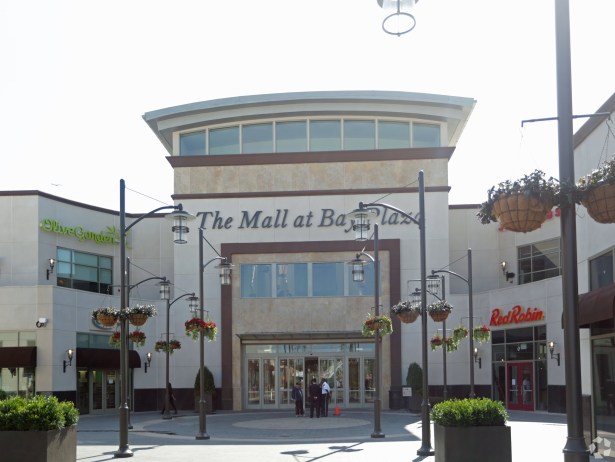
Plus Korean skincare products, called K-Beauty, have been very popular in the U.S.
In a recent deal, Innisfree, a South Korean cosmetics brand, took space at 750 Lexington Avenue between East 59th and East 60th Streets for its second U.S flagship, and second store in Manhattan. (The first is at 862 Broadway in Union Square.)
The new location is in a prime spot, adjacent to Bloomingdale’s with easy access to a transportation hub, said Cushman & Wakefield’s Christian Stanton, who represented the tenant in the transaction.
“They have number of stores in Korea, and they are fully vetted out in China,” Stanton said. “They just hadn’t entered this market yet. It’s a conservative approach, testing the market and looking into key markets for future rollouts.”
What makes Innisfree popular, he said, is its “health and lifestyle experience,” and its products are proprietary.
Hailing from Thailand, the husband-and-wife team behind Land Thai Kitchen and Pure Thai Cookhouse will be opening a new Thai restaurant called Talad Wat at 714 Ninth Avenue featuring farm-to-table dishes they ate while growing up in a village outside of Bangkok, according to information provided by Eastern Consolidated’s James Famularo, who brokered the deal.
Famularo has done New York City restaurant deals with Vietnamese, Chinese, Japanese, Indian and Thai chefs and business owners.
Americans love Asian food that has the “authenticity of a real transplant,” Famularo told CO.
Some of the brands aren’t explicitly Asian, but are nonetheless successful Asian companies looking to take the next step. Susan Kurland, an executive vice president and co-head of Savills Studley’s global retail services group, has signed the first U.S. lease for Giada, a high-end Italian fashion company, whose parent company RedStone Haute Couture is based in China.
The deal is for space in Boston’s Heritage on the Garden, in a building housing other luxury brands, Hermes and Bottega Veneta. Giada targeted a smaller market for a soft launch in the U.S., Kurland said.
“They have in excess of 50 stores in Asia so far,” Kurland said. “They feel the U.S. is a very important market,” so after Boston, the company plans to expand into New York City.
For Chinese companies in general, the U.S. is “a great marketplace and it’s a market they haven’t really explored before. There are some great brands in China…If you think about it, where else are you going to expand to? Where else do you have a plethora of people in a democracy that can purchase whatever they want provided they have the financial wherewithal.”
One Chinese restaurant business is planning to enter the East Coast by way of Queens, targeting the Chinese population in the borough. As reported last month, Chinese eatery HaiDiLao, a Sichuan-style hot-pot chain, signed a 12,000-square-foot deal at 38-18 Union Street—one of the buildings at the Flushing Commons development.
“Flushing Commons is the ideal place for Hai Di Lao to launch on the East Coast,” Yin Li of Savills Studley, who handled the deal for HaiDiLao, said in prepared remarks in March. “The cultural vibrancy of the area, quality of the space and proximity to transit and a large Chinese population provide the perfect combination for HaiDiLao to make a successful introduction to the New York market.”
Beijing-based hot pot chain First Lamb Shabu is opening its first Manhattan location in the East Village after inking a lease at 218 East 14th Street, CO reported last week. The restaurant will be the Chinese hot pot chain’s second-ever location in the U.S., following its first at 136-72 Roosevelt Avenue in Flushing, Queens—though it has more than 300 locations across China.
Eastern Consolidated’s Aric Trakhtenberg, who represented landlord Dromos Corp. with Kevin Bisconti, described First Lamb Shabu as “a successful international brand,” featuring “a young, urban ambiance that will attract young professionals living in the East Village as well as students attending nearby colleges and universities.”
A lot of the retail ventures hailing from China have been tech-oriented, Hirschfeld said. He cited as an example DJI, a drone manufacturer, which is looking for showroom space in all major gateway markets. In addition, he noted that the Chinese are responsible for establishing virtual reality concepts in the U.S. Hirschfeld has shown Las Vegas space to SoReal, a Beijing virtual reality theme park co-founded by the director of House of Flying Daggers and The Great Wall.
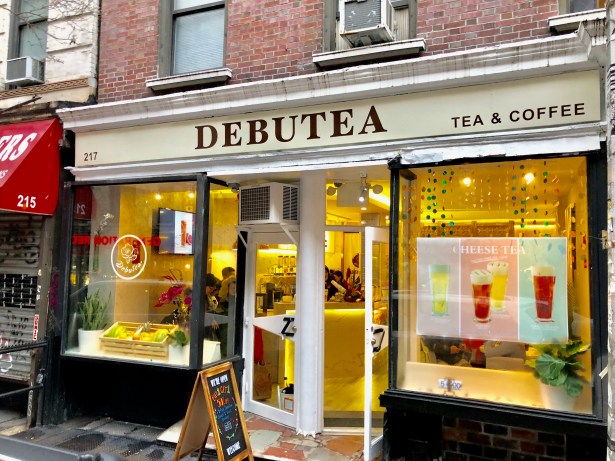
JNBY, a Chinese-based fashion company has established a few stores in the U.S.—one in Seattle and two in San Francisco. “I think the product offering is elegant, sophisticated and is not traditional Chinese consumerism,” Hirschfeld said.
Chinese teahouse Debutea opened its first U.S. location at 217 Thompson Street between Bleecker and West Third Streets at the end of February. The company, which has over 100 stores in China, sells high-end tea and coffee, desserts and Taiwan Cheese Tea, a drink that includes a thick layer of slightly sweetened and salty cheese cream added on top of a tea base.
After New York City, Debutea is looking to expand into the boroughs followed by Washington, D.C., Boston, Chicago and Philadelphia, Douglas Elliman’s Faith Hope Consolo (who represented both sides in the New York transaction) told CO.
Not all Asian concepts will work in the U.S. Ones that are “esoteric” to a local market, like stores selling Indian saris or Japanese kimonos, won’t resonate in America. “It’s not classic fashion,” Hirschfeld said. “It’s not the way we dress.”
Beyond food, Hirschfeld said India is “a market more people go into as opposed to out of.”
All in all, coming to the U.S. is kind of a no-brainer due to the consumer population.
“Our retail sales in the U.S. are greater than those in Spain, Italy, Germany, U.K. and France all together,” Hirschfeld said.
And coming to New York, “is like a badge for success,” Hall said.
But it wasn’t that long ago that certain Asian concepts were confounding to Americans. Hall recalls how difficult it was for New Yorkers to embrace Tokyo import Inakaya when it opened in the New York Times building at 231 West 40th Street in 2009. The upscale restaurant features Tokyo’s robatayaki (slow-grilled cooking) in front of the patron along with a theatrical staff.
“They weren’t received overly well,” said Hall, who did the eatery’s PR. “It was a lot of noise, it was very boisterous and people weren’t used to that concept. The small plates, having to order from different sections of the menu—the majority of Americans, or New Yorkers even, weren’t that familiar with that.”
Those days are long gone, especially in New York City.
With additional reporting and translation services provided by Liam La Guerre.



